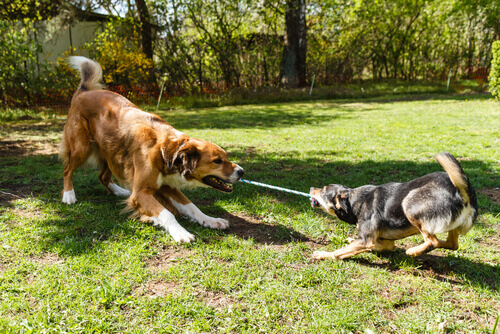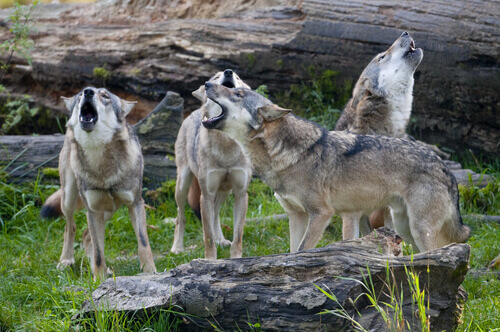The Animal Intelligence Test that Dogs Fail

Scientists love testing the intelligence of animals. We know that dogs are some of the smartest animals in existence, but, curiously, they fail an animal intelligence test that wolves and even parrots pass with flying colors.
What animal intelligence tests measure
Although we call them intelligence tests, in reality these experiments examine many other things that may have no relation to intelligence as we humans know it. They’re certainly not math or logic experiments: they test certain capacities and behaviors of animals, such as cooperation, altruism and the awareness of fairness.
One of the most talked-about experiments in recent years measured this last variable: two monkeys had to do the same exercise to get a reward. Again and again, one of the monkeys was given a reward with much more value than the other. The scientists observed what happened.
After just a couple of repetitions, the monkey receiving the lower-value reward began to get angry. Eventually it rejected the reward altogether. However, they observed that it directed its anger at the person dispensing the rewards, not at its fellow ape. In one of the groups, they even found that the other monkey tried to share its reward with its partner.
The test that dogs fail
The animal intelligence test that dogs fail was intended to find out how far cooperation between two animals of the same species can go. Researchers have performed it with many different kinds of animals.
The experiment uses a platform with wheels, on top of which are several very appetizing treats. However, this platform is behind a fence; the animals have to drag it by two ropes, which they must pull at the same time, in order to get access to the treats.

After performing this experiment for some time scientists discovered that elephants are able to solve the problem in a very short time; parrots and crows also end up figuring out how to get the food.
A surprise came with wolves: they were able to solve the problem very quickly. They showed a great mastery of cooperation even when they arrived at different times at the ropes; the one who arrived first waited for the second one to start pulling.
Dogs, however, did not fare as well. It took them a while to discover that the rope was for pulling, and then they were unable to coordinate pulling both ends at the same time. The dogs always missed out on their treats.
In some experiments, highly trained dogs, such as rescue dogs, managed to solve the puzzle after a while. But only the highly-trained ones. Domestic dogs don’t know how to cooperate with each other.
Possible explanations
After each animal intelligence test, the researchers attempt to explain the results. Before developing this test, scientists had expected dogs to be able to solve the problem, so, after the surprise results, they had to find a theory to explain it.
Scientists say it was to be expected that animals such as parrots or crows would get the rewards: in nature they’re forced to cooperate with each other. Moreover, crows communicate with each other and if one needs protection others will help or accompany them.
The same is true for elephants. They lead a nomadic herd life where they face more complicated challenges than pulling ropes at the same time. Recently, a video went viral in which several elephants collaborated to pull a trapped calf out of a pool.

However, dogs have evolved to depend on humans. Dogs began to differentiate themselves from wolves when they roamed around early human settlements and fed on garbage: they no longer needed to collaborate to eat.
Dogs are therefore more dependent on humans than on other dogs. They haven’t needed the help of other dogs to survive for many generations and have forgotten how to cooperate. That doesn’t mean that they can’t live together and be friends with other dogs! They’re just used to solving problems alone.
Animal intelligence tests are very varied and, although they don’t measure intelligence in the same sense that we measure it in humans, they allow us to discover surprising facets of animal psychology.
Scientists love testing the intelligence of animals. We know that dogs are some of the smartest animals in existence, but, curiously, they fail an animal intelligence test that wolves and even parrots pass with flying colors.
What animal intelligence tests measure
Although we call them intelligence tests, in reality these experiments examine many other things that may have no relation to intelligence as we humans know it. They’re certainly not math or logic experiments: they test certain capacities and behaviors of animals, such as cooperation, altruism and the awareness of fairness.
One of the most talked-about experiments in recent years measured this last variable: two monkeys had to do the same exercise to get a reward. Again and again, one of the monkeys was given a reward with much more value than the other. The scientists observed what happened.
After just a couple of repetitions, the monkey receiving the lower-value reward began to get angry. Eventually it rejected the reward altogether. However, they observed that it directed its anger at the person dispensing the rewards, not at its fellow ape. In one of the groups, they even found that the other monkey tried to share its reward with its partner.
The test that dogs fail
The animal intelligence test that dogs fail was intended to find out how far cooperation between two animals of the same species can go. Researchers have performed it with many different kinds of animals.
The experiment uses a platform with wheels, on top of which are several very appetizing treats. However, this platform is behind a fence; the animals have to drag it by two ropes, which they must pull at the same time, in order to get access to the treats.

After performing this experiment for some time scientists discovered that elephants are able to solve the problem in a very short time; parrots and crows also end up figuring out how to get the food.
A surprise came with wolves: they were able to solve the problem very quickly. They showed a great mastery of cooperation even when they arrived at different times at the ropes; the one who arrived first waited for the second one to start pulling.
Dogs, however, did not fare as well. It took them a while to discover that the rope was for pulling, and then they were unable to coordinate pulling both ends at the same time. The dogs always missed out on their treats.
In some experiments, highly trained dogs, such as rescue dogs, managed to solve the puzzle after a while. But only the highly-trained ones. Domestic dogs don’t know how to cooperate with each other.
Possible explanations
After each animal intelligence test, the researchers attempt to explain the results. Before developing this test, scientists had expected dogs to be able to solve the problem, so, after the surprise results, they had to find a theory to explain it.
Scientists say it was to be expected that animals such as parrots or crows would get the rewards: in nature they’re forced to cooperate with each other. Moreover, crows communicate with each other and if one needs protection others will help or accompany them.
The same is true for elephants. They lead a nomadic herd life where they face more complicated challenges than pulling ropes at the same time. Recently, a video went viral in which several elephants collaborated to pull a trapped calf out of a pool.

However, dogs have evolved to depend on humans. Dogs began to differentiate themselves from wolves when they roamed around early human settlements and fed on garbage: they no longer needed to collaborate to eat.
Dogs are therefore more dependent on humans than on other dogs. They haven’t needed the help of other dogs to survive for many generations and have forgotten how to cooperate. That doesn’t mean that they can’t live together and be friends with other dogs! They’re just used to solving problems alone.
Animal intelligence tests are very varied and, although they don’t measure intelligence in the same sense that we measure it in humans, they allow us to discover surprising facets of animal psychology.
This text is provided for informational purposes only and does not replace consultation with a professional. If in doubt, consult your specialist.








